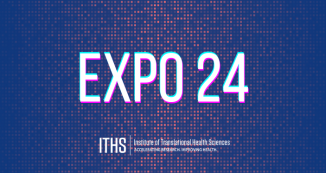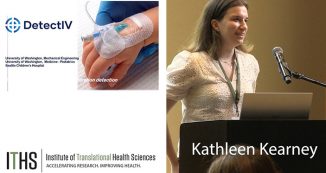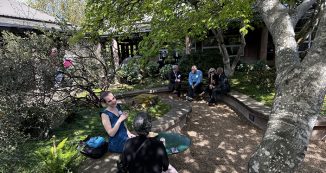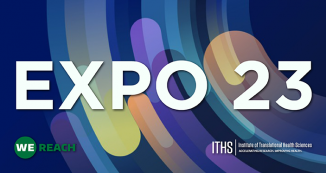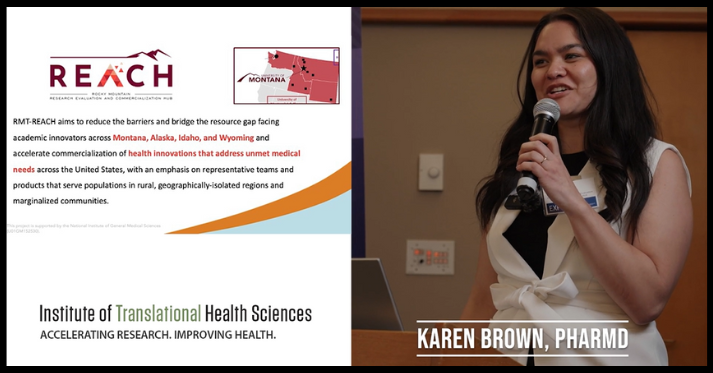
28 Jun Breaking Ground in Biotech: ITHS EXPO Lightning Talks
This year’s ITHS Expo showcased cutting-edge advancements in nanotech in medicine featuring two distinguished key note speakers, Dr. Philip Low and Dr. Rodney Ho.
Alongside the keynotes, the event included an hour of captivating lightning talks spotlighting the pioneering inventions in the biomedical realm. Below, we have captured those lightning talks for you, each illustrating incredible healthcare innovation in under three minutes.
Zeinab Barati, PhD: Revolutionizing ICU Care: A Novel Portable Device for Detecting Consciousness in Unresponsive Patients
Dr. Zeinab Barati’s project addresses the challenge of detecting covert consciousness in patients with disorders of consciousness (DoC) resulting from severe brain injury, such as coma and vegetative states. Affecting over a million people annually, these conditions pose significant diagnostic and prognostic uncertainties, impacting patient care decisions and imposing high costs. Traditional behavioral assessments often fail to identify covert consciousness present in about 20% of behaviorally unresponsive patients. Dr. Barati’s team at Intrinsic Powers Inc. is developing techniques to reliably detect covert consciousness and provide prognostic insights, aiming to improve ethical and clinical decision-making for DoC patients.
Dr. Ayokunle Olanrewaju, an assistant professor at the University of Washington, is developing user-centric microfluidics for decentralized therapeutic drug monitoring. This technology aims to replace the traditional one-size-fits-all approach to drug dosing by providing rapid, cost-effective, and portable tests for precise drug level measurement. Utilizing capillary microfluidics, which controls liquid handling through channel shape and chemistry, the system can perform complex tests, similar to transitioning from bulky cell phones to compact smartphones. Initial applications include wearable blood collectors for home use and collaborations with the Center for Innovations in Cancer and Transplant to address unique patient needs.
Prakit Saingam, PhD: Delivery System for an Effective Microbial Sink of Uremic Toxin
Dr. Prakit Saingam’s research focuses on addressing the accumulation of protein-bound uremic toxins, specifically p-cresol sulfate, in individuals with impaired kidneys. The study explores the use of encapsulated microbial degraders, particularly T. aminoaromatica S2, within polyvinyl alcohol and sodium alginate hydrogels as an oral delivery method to remove p-cresol from the colon. This innovative approach packages high-density microbial cells in hydrogels to form a p-cresol-consuming microbial sink. The research demonstrates the potential of these hydrogels to significantly degrade p-cresol in the gut, reducing the burden on kidneys and improving patient outcomes.
Dr. Trey Coker’s project addresses the high incidence of musculoskeletal injuries among military personnel, which affects over 50% annually and leads to substantial medical costs. The project introduces Minimus2, a microencapsulated blend of essential amino acids (EAAs) that offers more than 90% EAAs by mass. This innovation boasts digestibility and bioavailability that are 2.5 times higher than the highest quality protein, optimizing muscle remodeling during physiological stress. Supported by a $1.9 million Army SBIR Phase II grant, the project will conduct a clinical trial to test Minimus2’s effectiveness under physical stress and negative energy balance, aiming to reduce injury rates and secure government contracts for its implementation.
David Bridges, MS Entre: Exercise-Rx
David Bridges introduces ExerciseRx, a collaborative effort by The Sports Institute at UW Medicine, UW CSE UbiComp Lab, and UW Human Centered Design & Engineering. ExerciseRx is a software platform integrated into routine healthcare, enabling providers to deliver personalized physical activity support to patients. It aggregates data from smartphones or wearables on a clinician dashboard, facilitating actionable insights. ExerciseRx includes at-home exercise routines and employs novel, multimodal sensing via smartphones, enhanced by AI/ML for real-time user feedback. Currently deployed in research with institutions like Fred Hutch Cancer Research Center and Seattle Children’s Hospital, ExerciseRx aims to enhance exercise adherence and health outcomes.
Karen Brown, PharmD: Launching the Rocky Mountain Research Evaluation and Commercialization Hub at the University of Montana
Dr. Karen Brown introduces the Rocky Mountain Research, Evaluation, and Commercialization Hub (Rocky Mountain REACH) at the University of Montana. This newly funded initiative, supported by a $4 million NIH award, aims to foster biomedical innovation across the region. Collaborating closely with NIH institutes, SEAD office, and other hubs, Rocky Mountain REACH focuses on supporting under-resourced innovators in rural and tribal communities. Their mission includes providing funding, project management, expert feedback, and training to advance biomedical technologies addressing regional health disparities and promoting economic development.
Chris Goss, MD, MSc: Innovative Approaches to Improving Recruitment of Under-Represented Participants into Clinical Trials
Dr. Chris Goss, representing the HUB liaison team for ITHS, discusses innovative strategies for improving the recruitment of underrepresented participants in clinical trials. Following Washington State’s pioneering House Bill 1745, which mandates diverse enrollment in drug and device trials, the team is exploring remote technology, recruitment support services, and advanced E-consent methods. They aim to enhance trial participation by leveraging social determinants of health alongside clinical characteristics for identifying eligible participants. This approach seeks to create universal recruitment strategies, ensuring broader inclusion of minority and rural populations in clinical research.
Uly Rivera: CoLabs @ 222Fifth
Uly Rivera introduces CoLabs @ 222Fifth, a biotech incubator located near Seattle Center, designed to support early-stage and venture-funded startups. CoLabs offers operational support with plug-and-play labs, office spaces, meeting rooms, and specialized equipment. It also provides access to a network of investors, mentors, and advisors, and aims to secure cost-effective purchasing similar to academic rates. Opening in September, CoLabs seeks to be a collaborative partner, helping startups navigate the challenges of entrepreneurship and connect with the Seattle life science community.
Blake Wiedenheft, PhD: CRISPR-Based Recombinant RNA Technologies for Engineering the Human Transcriptome
Dr. Blake Wiedenheft, a professor at Montana State University, presents his research on CRISPR-based recombinant RNA technologies for engineering the human transcriptome. His team is exploring a novel use of CRISPR systems to edit RNA instead of DNA, addressing the challenges of DNA editing in cells without nuclei or where DNA editing is toxic or ethically problematic. They demonstrated that introducing the type III CRISPR system into human cells can effectively edit RNA, knocking down 95% of targeted RNA and repairing the remaining transcripts in a programmable way. This approach holds potential for correcting genetic diseases by repairing RNA to bypass premature stop codons, as evidenced by their success in restoring functional CFTR protein in cystic fibrosis models.
Oliver Nakano-Baker, PhD: Nose-on-a-Chip: A Platform for Rapid, Breath-Based Diagnostics
Dr. Oliver Nakano-Baker introduces a groundbreaking biohybrid sensor platform aimed at detecting diseases through exhaled breath. Inspired by trained dogs’ ability to detect COVID-19 and cancer from volatile organic compounds (VOCs), this technology leverages carbon nanotube transistors and surface-binding peptide molecules derived from olfactory proteins. Developed through molecular machine learning, these sensors target specific VOCs associated with various conditions. Validated to detect disease markers at parts-per-billion concentrations in human breath, this “nose-on-a-chip” technology promises mobile breathalyzers capable of rapid diagnoses for viral and bacterial infections, early-stage cancers, and monitoring blood glucose levels, potentially revolutionizing healthcare diagnostics.
David Koelle, MD: A New Way to Measure (T cells) Immune Responses to Vaccination
Dr. David Koelle from the University of Washington discusses a novel method for assessing immune responses to vaccination using T cell receptor (TCR) sequencing. This approach measures changes in T cell populations after vaccination, revealing new antigen-specific T cells that appear in response to the vaccine. The method, validated with data from COVID-19 vaccines, offers advantages over traditional techniques by being cost-effective and requiring simpler sample handling. However, challenges include proprietary data sets and the need for public databases. This technique holds promise for broad applications in monitoring vaccine efficacy, though it may be less suited for personalized cancer vaccines due to individual-specific T cell responses.
The ITHS website is your source for information about translational research resources in the WWAMI region. Find us on Facebook, X, and LinkedIn. Sign up for our newsletter, “The Research Connector,” here!




